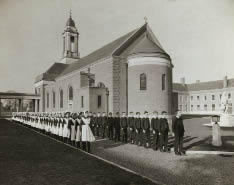Foundling Voices at the Foundling Museum in London’s Bloomsbury (until 30 October) is the fruit of an oral history project that recorded the memories of 74 men and women (the youngest is now 68, the oldest 98) born to unmarried mothers who were placed as babies in the care of the Foundling Hospital Schools in the first half of the 20th century.
Foundling Voices at the Foundling Museum in London’s Bloomsbury (until 30 October) is the fruit of an oral history project that recorded the memories of 74 men and women (the youngest is now 68, the oldest 98) born to unmarried mothers who were placed as babies in the care of the Foundling Hospital Schools in the first half of the 20th century.
The world of these ‘lost children, given up children’, as one interviewee Richard Woollcott describes them, is brought movingly and vividly to life through a mix of photographs, films and artefacts but most effectively through the audio recordings that are the heart of the exhibition.
Immersed in a sea of voices, the visitor is transported to an environment a million miles from the prevailing orthodoxy of child-centred parenting; one that strikes the modern sensibility as mostly cruel, loveless, regimented and closed.
Especially poignant are scrapbooks containing letters from birth mothers (which foundlings saw only many years later, as adults). Ruby Powell, enquiring after her son Richard Endsleigh, writes simply: ‘Will you kindly let me know if my child is quite well.’
But there are moments of joy to be found, too. Small acts of rebellion are gleefully recalled: stuffing the yellow fat on the mealtime meat down knickers to throw away later, scrumping for apples and midnight feasts. This is a fascinating slice of social history, a potent antidote to what one former pupil dubs ‘the routine of the silence’ and a testament to the power of telling stories.






Comments